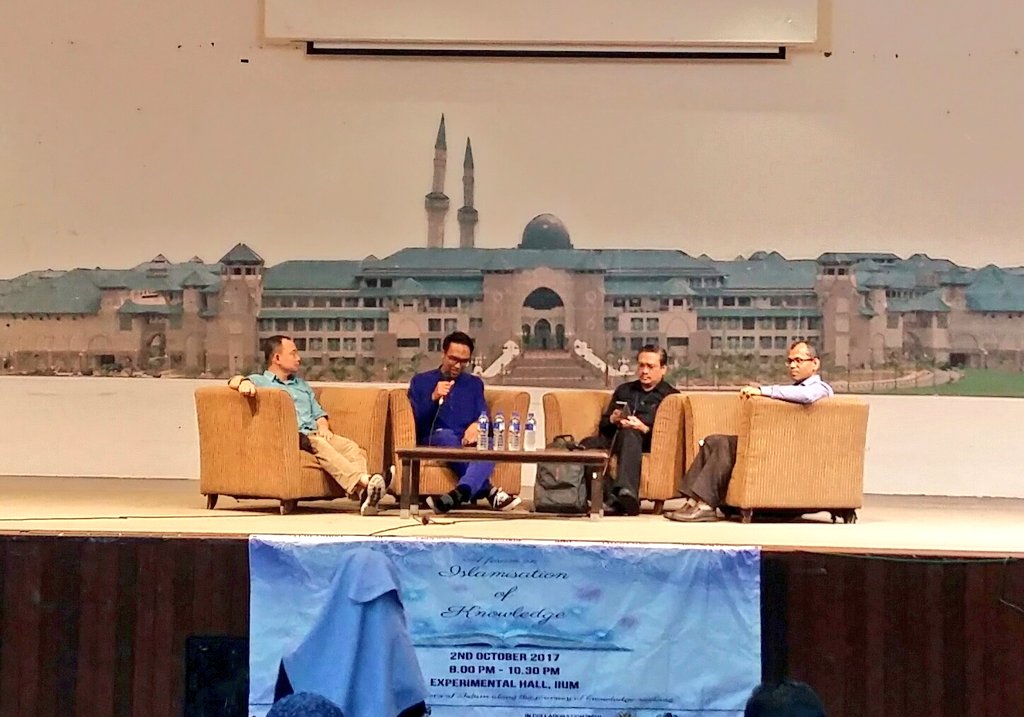By Miza Afrina
GOMBAK, 3 October 2017: The importance of learning IRK (Islamic Revealed Knowledge) subjects was the highlight of discussions at a forum on œIslamisation of Knowledge (IOK) held here on Monday night (2 October) to make the knowledge appear more “humane”.
Organised by the Secretariat of English Language and Literature (ELITS) in collaboration with Secretariat of Political Science (POSSA) and Secretariat of Psychology (PSYCSTA) and held at the Experimental Hall, the forum was aimed at helping the students to understand the Islamic world view and its significance to their studies.
The forum was intended to ensure students get a clear view on the actual Islamised knowledge as the university tends to include Islamic perspectives into each lesson.
Moderated by Rahimie Ramli, a representative from ELITS, the forum was delivered by three honourable panelists “ Dr. Mahmudul Hasan from the Department of Linguistic and Literature, Dr. Alizi Alias from Psychology Department, and Dr Maszlee Malik from the Department of Political Science.
The forum started with Dr. Mahmudul highlighting how IOK should not be confined to Muslims only that it may have multiple perspectives and the view can be shared by people of different backgrounds.
Meanwhile, Dr. Maszlee mentioned about al-Farouqis approach that, in order to incorporate Islamic worldview into the existing knowledge, tawhidic elements must be added into it as IIUM also has been built based on that philosophy. He then added Abdel Wahab El-Messiris approach that another important thing is to bring in the Islamic epistemology to evaluate the existing social sciences.
œIt is not necessary for us to Islamise the knowledge as every knowledge comes from Allah but it is important for us to look at it critically by trying to understand the general principle of Quran. Therefore, both western cultures and epistemology and our own worldview in approaching knowledge need to be celebrated,” said Dr. Maszlee.
Dr. Maszlee also mentioned that one of the founders of IIUM, Datuk Seri Anwar Ibrahim once said that the major aim of Islamisation of knowledge is to produce a œHomo Islamicus, an Islamic man who is responsible on his Islamic view. In other words, instead of œIslamising knowledge, making the knowledge more œhumane is more important because being a “Homo Islamicus” will definitely help in producing a better youth.
On the other hand, Dr Alizi reminded the students that being exposed to both IRK subjects and social sciences subject alone is actually not a sufficient tool to achieve Islamisation but reading books by Islamic theologians or philosophers outside the campus is also important. This explains that in gaining knowledge, one cannot depend on only one source especially when it involves theories from other religions.
He also added that setting a right intention and passion in studying IRK will help students in every aspect of life. Dr. Alizi also mentioned that Prof. Kamal Hassan, in one of his books introduced the term œrelevantization for IRK. The book claims that students need to ˜relevantize IRK so that it becomes contemporary and does not look inflexible. At the same time, social sciences need to be Islamised not because it lacks the Islamic value but to avoid confusion between western and Islamic view in the field.
Apart from that, Dr. Mahmudul also quoted Fathurrahman by saying, œYou dont have to Islamise rather Islamise the person. You create responsible human being, then responsible human being will use knowledge responsibly as the aim of Islam is to also bring humanity.
Lastly, Dr. Mahmudul urged everyone to approach something by combining religion and humanism perspectives as an effort to make the world a better place to live. Since the IIUM community are exposed to Islamic teaching, it is such a waste if the advantage of learning IRK subjects is taken for granted.***
